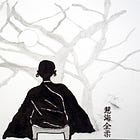Disruption
Turning around the light to shine within
My last post ended with
Perhaps I should heed Kobun Chino’s advice and sit down for a while.
There has been a lot of energy within and around me, encouraging a certain intensity. That is all right. Yet, it is crucial to maintain awareness in the middle of great energy and intensity. I know from experience how lapses in awareness can lead to unnecessary injury and suffering. Perhaps you do, too.
Sometimes, such injury and suffering happen suddenly, and we feel them immediately. Overwhelmed by our To-Do List, we rush out the front door, tripping and tumbling down the stairs. Other times, injury and suffering happen slowly and remain undetected for long periods. Feelings of competition and jealousy simmer below the surface, straining a relationship until the conditions are right for them to emerge, revealing themselves in body and speech. The relationship may end when this happens, a loss for both parties and, potentially, many others.
Of course, these two progressions are not mutually exclusive. They may not be separable in actuality, either. Sudden and immediate may follow slow and undetected; slow and undetected may follow sudden and immediate. But the sudden and the immediate and the slow and the undetected are distinguishable in thought. There is something important about that.
The quotation from which comes Kobun Chino’s advice does not concern energy or intensity. At least, it does not appear to concern them. What does it concern? A response to that question depends partly on where you are right now. So, I invite you to ask:
Where am I in this moment? What is alive within me? What is moving through me?
For this one, the quotation concerns—from one point of view, anyway—responsibility. It reads:
The more you sense the rareness and value of your own life, the more you realize that how you use it, how you manifest it, is all your responsibility. We face such a big task, so naturally we sit down for a while.
The first time I read these words, sitting down for a while followed recognition of the rareness and value of my life and responsibility for how I use it. How I use and manifest this life is all my responsibility, and that is a big task. Therefore, I may want to sit down for a while.
Here, the responsibility concomitant with the rareness and value of my life was felt as a burden. It is great and weighty, and shouldering it skillfully involves sitting down and stopping. Similarly, Thich Nhat Hanh encourages us every day to find time for
Stopping. Calming. Resting. Healing.
Sometime later, however, I read Kobun Chino’s words and did not see the rareness and value of my life and accompanying responsibility as imposing a heavy burden onto my shoulders. Instead, I saw them as liberating, releasing me from the weights I was already carrying, and that dragged me down. If how I use and manifest this precious life is all my responsibility, then I can sit down for a while. Sitting down is a choice; I have the freedom to sit down.
Reading Kobun Chino’s words from this point of view, where responsibility is liberating rather than a burden, was possible when, as Eihei Dogen describes it, I took “the backward step and turn[ed] the light inward.” Shitou Xiqian also expresses such a shift as “turn[ing] around the light to shine within, then just return[ing].”
I stopped looking exclusively “out there.” That is, I stopped looking only in the direction of real and imaginary others who demand that I fulfill this or that obligation, expect me to act in a specific way, or require that my priorities be ordered to reflect their preferences alone. In the same way that it is crucial to maintain awareness in the middle of great energy and intensity, it is necessary to remain in touch with where I am, what I need, and what I can offer. It is a balancing act; sometimes, we describe it as walking the “razor’s edge.” And, more often than not, it begins at home. Once more, I invite you to ask:
Where am I in this moment? What is alive within me? What is moving through me?
Recently, I experienced a same-in-form turning but with different content.
The past two to three months saw a lot of change. At one point, I described the last few months as “one disruption after another” or “a seemingly unending series of disruptions.” Near the center of these and other descriptions was a feeling of victimhood. The many things “out there” were changing, disrupting me and my life. It felt intentional and personal. I struggled to welcome it, or at least not respond with hostility and rejection; cool indifference would signify some small progress. And crafting a story free from notions of what I did and did not deserve was difficult.
Also, there were doubts about narrative construction and storytelling in the whirlwind. “Why bother trying to make sense of anything that happens?” I found myself saying over and over. The position from which I viewed a situation seemed irrelevant when set alongside the desired outcome of sense-making; multiple positions strung together fared no better and, in some cases, worse.
Nigel Tufnel, Spinal Tap’s lead guitarist, holds an all-black album sleeve and asks, “It’s like, how much more black could this be? And the answer is none. None more black.” No, Nigel. To my surprise, we can say “some more black” sometimes.
And I remembered one of the closing lines to a chant called “Liberation From All Obstructions”:
and truth is not a thing
I did not simply think this was true—and never mind the apparent paradox of thinking true a statement that denies the very thingness of truth—but felt its full substance and utter insubstantiality simultaneously. There were contradictions aplenty, somehow stacked securely on top of frustration and suffering.
I shared all this and more with a friend and Dharma Teacher during sanzen one afternoon. Without delay, he asked me, “Taishin, what has got in the way of your freedom?”
I did not hear the question in its intended way at first. The puzzled look on my face showed that. “What do you mean?” I thought. “I just finished sharing all these things with you! From there, the line to a response to your question is short and straight!”
He asked again, “Taishin, what has got in the way of your freedom?” Then, the turn happened.
I had gotten in the way of my freedom. I-me-mine had arisen again: I wanted others to behave in particular ways and not others, for their decisions and subsequent actions had made things difficult for me, and all of this was not mine to bear.
I-me-mine. I-me-mine. I-me-mine.
There was disruption, though none was intentional and only under a particular description “personal.” The expectations and preferences that form a substantial part of this ego were brushing up against reality; there was effort and failure to push things in a favorable (relative to them) direction. There was, too, an unwillingness to accept how things were and would continue to be—and there was a choice: I could either continue to wrap myself up in I-me-mine, or I could open up to the disruption-as-dislodging of those expectations and preferences from their places.
These recent disruptions need not be a seemingly unending series of burdens on my tired shoulders. They could be calls to liberation, reminders to let go of the weights I am carrying and dragging me down. And it starts at home, with “turn[ing] around the light to shine within, then just return[ing].” Or, once more:
Where am I in this moment? What is alive within me? What is moving through me?
Now, it is time to pivot.
The first stanza of the first cycle of Dongshan Liangjie’s Five Ranks, titled “The Contingent within the Essential,” reads:
At the beginning of the third watch, before moonrise, don’t be surprised if there is meeting without recognition; one still vaguely harbors the elegance of former days.
When reflecting on how my perspective has shifted recently, it has been challenging to not be critical of myself. “Oh, I should have seen this or that sooner,” I say. “Why did I not see this same pattern arising again?” or “How did I get caught once more?!” I think. I feel as though I am on the third watch before moonrise: alone in the dark, confused and lost, perhaps able to see some movement or hear a sound in the distance, though by no means is the seeing or the hearing clear.
The freedom that darkness offers is uncomfortable.
And so I want. I want to be standing in the moon’s light or, better, in the sun’s light, where everything is bright and easy to see, and things are quieted by the heat and, perhaps, easier to hear.
But I am not. Instead, it is the night or the early hours of a new day. Everything is murky; I am meeting something—or many somethings—but without recognition. A friend of mine described this situation as akin to ships passing one another at night. And I still cling to wisps of former days, though not necessarily for their “elegant” content. In some cases, nothing about the content of the wisps is pleasing or graceful; what is is what I select to focus on because it is clear and simple—their form.
This brings me to three simple words that I overlooked when sitting with the above stanza:
don’t be surprised
Do not be surprised that old thought patterns appear again; do not be surprised that you do not see them arising immediately. Do not be surprised that you are caught within them; do not be surprised that for a while, all was illuminated, and now it is dark. Do not be surprised that there is a harboring of days that are no longer there.
Understand that this is an opportunity to practice kindness toward yourself and others, patience with yourself and others, and compassion, too. I am not the only one in this situation; we all are, in one way or another.
Thank you for reading.
By the way, when I opened my Substack inbox yesterday morning, I smiled when I saw that James Ford had offered some thoughts on the first stanza of the Five Ranks’s first cycle. You can read his reflection here. I encourage it.
Other recent offerings include:








This post goes to “11.”
Okay I admit I haven't read this piece yet -- though I am saving it to do so -- but a glimpse of Nigel Tufnel was enough to get me over here and see what was going on. Without a doubt one of the great rock docs of the last century ; )